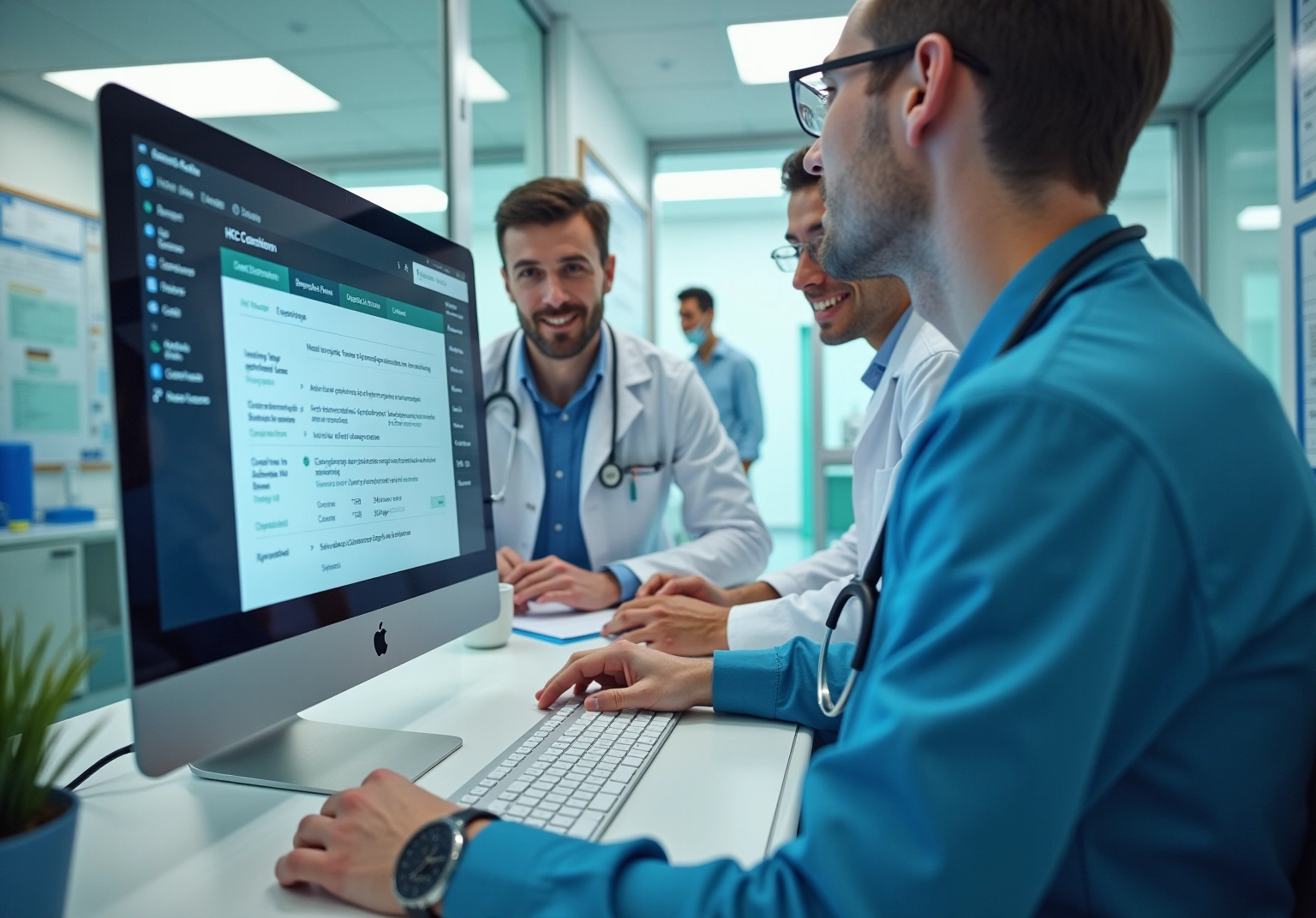
The article delineates ten significant advantages of CRM software in enhancing healthcare efficiency, underscoring its pivotal role in boosting patient engagement, optimizing operations, and refining data-driven decision-making. These advantages are substantiated by compelling evidence indicating that CRM systems can:
In an industry where efficiency and patient satisfaction reign supreme, the integration of Customer Relationship Management (CRM) software in healthcare has emerged as a transformative force. By harnessing the power of CRM, healthcare organizations can streamline operations, enhance patient engagement, and improve compliance—all while alleviating administrative burdens. Yet, as the landscape continues to evolve, a pressing challenge persists: how can healthcare providers fully leverage CRM technology to not only meet but surpass the escalating demands of patients and regulatory frameworks? This article delves into the ten transformative benefits of CRM software, illuminating how it can redefine efficiency and elevate the quality of care within the healthcare sector.
The Inferscience HCC Assistant automates the HCC coding process, significantly reducing the time and effort required for accurate coding. This innovative tool delivers real-time coding suggestions based on clinical data, empowering healthcare providers to maximize their Risk Adjustment Factor (RAF) scores and ensuring appropriate funding from Medicare Advantage contracts. Not only does it streamline workflows, but it also enhances compliance by minimizing coding errors, which can lead to costly penalties.
Case studies reveal that organizations utilizing the HCC Assistant have experienced substantial improvements in coding accuracy and efficiency, ultimately translating into higher reimbursements. For instance, accurate HCC coding can lead to annual payments that vary dramatically based on RAF scores, with one scenario yielding $32,000 compared to another at $9,000. Such financial implications underscore the critical importance of precise coding in managing intricate groups of individuals.
Additionally, the automation features of the HCC Assistant enable providers to focus more on patient care while ensuring that all billable services are recorded accurately. This capability decreases administrative burdens and enhances overall operational efficiency. To discover how the HCC Assistant can transform your risk adjustment processes and optimize Medicare Advantage funding, consider requesting a demo today.

CRM software for healthcare significantly enhances client engagement by equipping medical organizations with essential tools for effective communication. Automated reminders for appointments, follow-ups, and health screenings ensure that individuals remain informed and actively engaged in their care. By tailoring communication based on individual history and preferences, care providers can forge stronger relationships, leading to heightened satisfaction and loyalty. This strategic approach not only addresses the challenge of client engagement but also establishes a foundation for lasting partnerships between patients and healthcare providers using CRM software for healthcare.

Implementing CRM software for healthcare in medical environments significantly enhances operational workflows by automating essential tasks such as appointment scheduling, billing, and client follow-ups. Inferscience’s solutions, including the Care Gaps app and HCC Validator, specifically improve these workflows, enabling providers to identify and close care gaps directly within their EHRs while enhancing documentation for insurance claims to ensure compliance with HCC reporting requirements. This automation alleviates the administrative burden on medical staff, allowing them to concentrate more on patient care rather than paperwork.
Notably, entities that have adopted CRM solutions report an average time reduction of up to 30% in administrative tasks, empowering staff to allocate more time to direct client interactions. By optimizing these procedures, medical providers can greatly enhance operational efficiency, minimize the risk of errors, and ultimately achieve better outcomes for patients.
Research indicates that 61% of medical institutions utilizing CRM software for healthcare experience significant improvements in workflow efficiency, underscoring the vital role of this technology in enhancing service delivery. As the healthcare landscape continues to evolve, the integration of CRM software for healthcare, supported by Inferscience’s innovative solutions, is becoming increasingly critical for organizations aiming to optimize their operations and enhance care for patients.
To discover how Inferscience can support your organization, schedule a demo or download our white paper today.

CRM software for healthcare serves as a pivotal solution for organizations, equipped with robust data analytics features that streamline the collection and examination of client data. This capability not only facilitates informed decision-making but also enhances care quality, optimizes resource allocation, and drives operational improvements through CRM software for healthcare.
Understanding care gaps—situations where individuals have missed recommended checks or screenings—can profoundly impact outcomes and risk adjustment. For instance, organizations leveraging CRM data have reported a reduction in revenue cycle durations exceeding 15%, underscoring the tangible benefits of utilizing individual data for strategic decision-making.
Furthermore, the integration of advanced NLP tools can consolidate healthcare data, rectifying inaccuracies in risk adjustment and boosting coding efficiency. As the medical landscape evolves, the ability to effectively assess individual data will be crucial for improving care coordination and adherence, ensuring that organizations remain competitive and responsive to patient needs.
Experts emphasize that embedding data analytics into medical operations is essential for fostering innovation and enhancing the quality of care delivered to individuals.
The crm software for healthcare, including Inferscience’s EHR-integrated HCC Assistant, is designed to help organizations navigate complex regulations like HIPAA while simultaneously enhancing HCC coding efficiency and compliance through innovative solutions.
By implementing robust security measures and meticulously maintaining client records, these systems empower medical providers to meet their legal obligations effectively.
Inferscience’s dedication to data privacy and security, underscored by its achievement of SOC2 Type II certification, significantly bolsters trust in these systems.
Regular audits and updates within the CRM framework assist organizations in maintaining compliance, thereby reducing the risk of costly penalties and fostering trust.
Furthermore, these practices enhance the financial sustainability of medical organizations through accurate HCC risk adjustment coding, ultimately driving operational success.

CRM software for healthcare significantly enhances communication among medical teams by providing a centralized platform for sharing client information and coordinating care.
The integration of Inferscience’s AI-driven HCC coding tools eliminates manual processes and reduces coding errors, which can adversely affect long-term care outcomes.
By ensuring that all medical conditions are recorded accurately, this partnership guarantees that every team member is informed about client needs and treatment strategies, leading to more cohesive care delivery.
Furthermore, by merging structured and unstructured data, Inferscience’s solutions create a comprehensive view of health, ultimately improving overall outcomes.

CRM software for healthcare empowers providers to deliver personalized care by efficiently collecting and analyzing individual data, including medical histories, preferences, and feedback. This comprehensive data analysis enables providers to tailor services and treatment plans, ensuring they align with the unique needs of each individual. Such customized approaches significantly enhance the overall client experience, leading to improved satisfaction rates.
Indeed, organizations that implement personalized care strategies report a notable increase in client loyalty and trust—factors that are crucial for fostering long-term relationships in the medical field. As we approach 2025, the integration of CRM software for healthcare within medical services will be essential for enhancing personalized offerings, ultimately resulting in improved health outcomes and fostering a more engaged client base.

A significant advantage of CRM systems in medical environments lies in their ability to seamlessly integrate with existing electronic health records (EHR) and other medical technologies. This integration allows for the smooth exchange of individual information, effectively diminishing data silos and improving care coordination.
Inferscience’s API solution addresses the complexities of medical interoperability by enabling effortless HCC coding data exchange among providers, payers, and third-party vendors. By connecting disparate systems, medical institutions can optimize operations and enhance the accuracy of individual data. In fact, the combination of EHR and CRM systems has the potential to increase a medical organization’s revenue by as much as 50%, facilitating better access to client records and more efficient workflows.
This comprehensive strategy not only enhances operational efficiency but also significantly elevates the quality of patient care, ensuring that providers can focus on delivering optimal outcomes. Inferscience’s HCC Assistant exemplifies this integration by automating the collection and analysis of clinical data to improve Risk Adjustment Factor (RAF) scores. The API extracts and analyzes claims files in mere seconds using intelligent rules, providing insights in JSON format that enhance decision-making.
As the medical CRM market continues to expand at a projected CAGR of 7.7% from 2024 to 2030, driven by an increasing demand for structured data and automation, the importance of seamless technology integration becomes ever more apparent. According to Brian Moore, VP at NICCA USA, “The quality of research they have done for us has been excellent,” underscoring the effectiveness of Inferscience’s solutions in addressing compliance issues and overlooked diagnoses in HCC coding.

Implementing CRM software for healthcare addresses a significant challenge that medical facilities face: high operational costs. By automating administrative tasks and reducing manual errors, organizations can streamline essential processes such as billing, appointment scheduling, and follow-ups. This not only lowers operational costs but also enhances resource allocation, leading to substantial financial benefits.
Efficient medical database management systems facilitate seamless information transfer across departments, which is crucial for improving oversight of client services and operational metrics. As these systems integrate, they foster enhanced client engagement and satisfaction, which directly correlates with improved retention rates and financial efficiency.
Moreover, advanced data management minimizes mistakes in record keeping and provides vital information for automated billing. This ultimately decreases expenses and the time dedicated to documentation and administration, thus improving overall efficiency and adherence within medical workflows. The strategic implementation of CRM software for healthcare is not merely an operational improvement; it is a transformative step towards financial sustainability and excellence in client care.

In the competitive medical landscape of 2025, the implementation of CRM systems provides organizations with a significant advantage. These systems, including CRM software for healthcare, enhance user involvement, optimize operations, and ensure adherence, allowing healthcare providers to distinguish themselves from their competitors. A well-executed CRM strategy not only elevates the quality of care but also cultivates long-term loyalty and trust among clients.
Research indicates that focusing on client experience can yield a 15% increase in satisfaction and retention rates. Furthermore, organizations utilizing CRM technology have reported a 30% rise in client satisfaction, underscoring the direct correlation between effective CRM practices and improved relationships.
As healthcare continues to evolve, those who adeptly leverage CRM will not only meet but surpass patient expectations, thereby securing a competitive edge in the market.

The integration of CRM software in healthcare marks a pivotal advancement in enhancing operational efficiency, patient engagement, and compliance. By automating administrative tasks and providing data-driven insights, healthcare organizations can streamline their workflows and foster stronger relationships with patients. This transformative technology empowers providers to focus more on patient care while ensuring that all necessary information is accurately captured and utilized.
Throughout this discussion, several key benefits of CRM software have been highlighted. From maximizing funding through precise HCC coding to enhancing communication among healthcare teams, the advantages are unmistakable. The ability to deliver personalized care, ensure regulatory compliance, and reduce operational costs further underscores the critical role CRM plays in modern healthcare. Organizations that embrace these tools are likely to witness significant improvements in both patient satisfaction and financial performance.
Ultimately, the successful implementation of CRM software transcends merely keeping pace with current demands; it establishes a foundation for future growth and excellence in patient care. As the healthcare landscape continues to evolve, leveraging CRM technology will be essential for organizations striving to achieve a competitive edge. Embracing these innovations will enhance operational capabilities and lead to improved health outcomes, making it imperative for healthcare providers to invest in CRM solutions today.